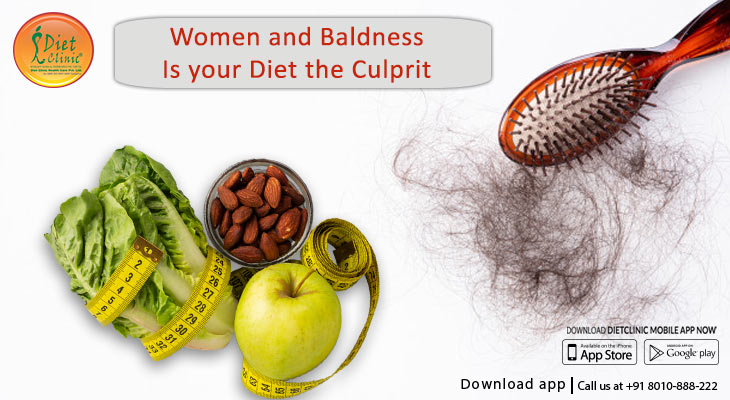
Dietician Sheela Seharawat
In today’s scenario, beauty is an important asset for any women. Many women define this beauty as long, shiny and bouncy hairs on their head. Almost every time you see a women grooming herself, they are busy doing their hairs. Looking at the importance of hairs in a women’s life, it is sad, but true, like men, women also face disappointment and sadness of hair loss and baldness. Despite how common it is, women suffers in silence that leads to a variety of confidence and self-esteem issues.
Hair has often have greater impact on women than in men, and all because of the fact that it is less socially acceptable. However, it has been seen that until the problem begins there is little or no through put into the nourishment and care of the hairs rather than lather and rinse and occasionally applying some oil or cream.
The Role of our Diet and Hair Health
Everything in our body, including our hair maintains its vitality and health by what we eat every day. If we eat unhealthy or our diet is poor it’s for sure going to show on our body including the hairs. Baldness in women could be sign of nutritional deficiencies, like deficiencies of vitamins A, D, B12, iron, zinc and protein.
One of the common cause of hair loss has been attributed to deficiency in iron. About 60% of the cases of women baldness is because of lack of proper iron feed and it often goes undiagnosed. Due to higher iron requirements as a result of menstruation, women need more iron in their diet.
In here let’s understand the effects and benefits of eating a good and healthy diet:
Protein and Hair Loss
Proteins are needed to build tissue cells, even the ones of our hairs, skin and nails. Almost 80 to 85% of our hairs are composed of a protein called keratin. Without sufficient availability of protein, our hair can become brittle and fall out before it reaches the length that it’s capable of. Hence it can be well established that a diet deficient of proteins and amino acids can heavily contribute to baldness and hair loss.
The best sources of proteins are ‘primary proteins’ or ‘animal proteins’, which include fish, eggs, lean meats, red meat, poultry and cheese. Dairy and dairy products, legumes and beans are also valuable source of proteins.
The All Essential Fatty Acids
Essential fatty acids are fatty acids that are vital for our body, but cannot produce of its own and can only be obtained through the food we eat. Good fats like the Omega 3 and Omega 6 fatty acids are essential for the growth and wellbeing of our hairs. They also play a major role in brain function, normal growth and development and helps to reduce inflammation. Omega-3 fatty acids help with proper blood circulation and cell growth, which are important for our hair follicles. Malnutrition, stress and disorder of the scalp plays their part in hair loss and these fatty acids helps in increase nutrient absorption at the hair follicles, reduces stress and enhances the immune system functionality. Deficiency of these essential fatty acids results in dry scalp and flaky skin, dandruff, dry and brittle hairs also called eczema, and all of these results in faster hair loss and baldness.
Foods like fatty fish (salmon, tuna), flaxseed and soybeans are rich sources of essential fatty acids.
A Low Carb Diet to Control Hair Loss
Carbohydrates are important as they provide energy, and our hair cells – the second fastest growing cells in our body needs a lot of energy to grow. As hair is a non-essential tissue its needs are not prioritized and the energy is supplied to other places that needs it more like the heart. This deficit of carbs shows up in the form of excessive hair loss.
If our diet lacks complex carbohydrates, our body starts to convert the stored proteins, like muscles, into energy. This can be taxing on our kidneys and liver, and can cause various problems, including that of hair loss.
Healthy carbohydrates can be found in foods like whole grains, beans, peas, barley, oatmeal, brown rice and pasta, fresh fruits and legumes.
The all-important Iron
Iron is of much important in women than in men. A lot of iron is lost due to the female monthly menstruation cycle and this generally results in iron deficiency in most women. Researches show that when our body's iron levels are low, our hair gets into the resting stage and stops growing until we introduce more iron-rich foods into our daily diet.
Dark leafy vegetables, lean meats, nuts and seeds, fruits and eggs are good sources of iron supply for hairs.






